
EXPERIMENTAL ANIMALS
Scope & Guideline
Connecting researchers with transformative findings in animal science.
Introduction
Aims and Scopes
- Development of Animal Models:
The journal prioritizes research on developing and characterizing various animal models that mimic human diseases, which are crucial for understanding disease mechanisms and testing therapeutic interventions. - Genetic and Molecular Studies:
There is a significant emphasis on genetic engineering, genome editing techniques, and molecular biology studies in animal models, facilitating insights into gene function and disease pathology. - Pain and Welfare Assessments in Laboratory Animals:
Research focusing on assessing pain and welfare in laboratory animals is a core area, with methodologies aimed at improving the humane treatment of animals used in experiments. - Translational Research:
The journal encourages studies that bridge basic research and clinical applications, aiming to translate findings from animal models into potential therapies for human diseases. - Pharmacological and Toxicological Evaluations:
The journal includes research on the pharmacodynamics and pharmacokinetics of drugs in animal models, as well as studies evaluating the toxicological effects of substances.
Trending and Emerging
- Genome Editing and Genetic Manipulation:
There is a growing trend towards the utilization of genome editing technologies, such as CRISPR/Cas9, in animal models to study gene function and model diseases, indicating an increasing integration of genetic engineering in experimental research. - Neurodegenerative Disease Models:
Research focusing on animal models of neurodegenerative diseases, such as Alzheimer's and Parkinson's, is gaining traction, reflecting a heightened interest in understanding these complex disorders and developing potential therapies. - Microbiome and Gut Health Research:
Emerging studies exploring the role of the microbiome in health and disease, particularly in relation to metabolic and autoimmune disorders, are becoming more prominent, highlighting the significance of gut health. - Pain Management and Welfare Improvement:
With increased awareness of animal welfare, there is an upward trend in research dedicated to pain management techniques and improving the welfare of laboratory animals, which is critical for ethical research practices. - Personalized Medicine Approaches:
The journal is seeing a rise in studies that align with personalized medicine, utilizing animal models to investigate individual variability in drug response and disease susceptibility.
Declining or Waning
- Traditional Toxicology Studies:
Research centered on conventional toxicology studies has decreased, possibly due to the increasing emphasis on alternative methods and models that reduce animal use. - Basic Physiology Research:
There appears to be a waning interest in purely physiological studies without direct application to disease models or translational research. - Non-mammalian Animal Models:
The exploration of non-mammalian models, such as fish or invertebrates, has declined, as the focus shifts more toward mammalian systems that closely resemble human biology.
Similar Journals
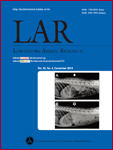
Laboratory Animal Research
Pioneering open access to transformative research.Laboratory Animal Research is a prominent academic journal dedicated to advancing the field of laboratory animal science, providing a platform for researchers, professionals, and students focused on biochemistry, genetics, and molecular biology. Published by SPRINGERNATURE, this journal is recognized for its rigorous peer-review process and commitment to high-quality research, achieving a notable Q2 ranking in the Biochemistry, Genetics and Molecular Biology category as of 2023. Since becoming an Open Access journal in 2015, Laboratory Animal Research has fostered greater accessibility and dissemination of research findings, encouraging collaboration and innovation within the scientific community. With its ISSN 1738-6055 and E-ISSN 2233-7660, the journal is based in the United Kingdom and resides at CAMPUS, 4 Crinan St, London, N1 9XW, England. It is an essential resource for anyone involved in laboratory animal research and strives to enhance the welfare and scientific use of animals in research settings.

Iranian Journal of Veterinary Research
Connecting Research and Practice for Animal WelfareWelcome to the Iranian Journal of Veterinary Research (IJVR), a prestigious platform dedicated to advancing the field of veterinary science. Published by Shiraz University, this journal plays a pivotal role in disseminating high-quality research findings amid a vibrant academic community. With its ISSN 1728-1997, and a convergence of studies from 2008 to 2024, IJVR serves as an essential resource for veterinarians, researchers, and students interested in Animal Science and Zoology. Recognized in the Q3 quartile for both Animal Science and Veterinary categories, it holds a respectable position with Scopus rankings placing it in the 54th percentile among general veterinary journals. Although it currently lacks an open access model, the journal ensures that cutting-edge veterinary research is presented with rigor and relevance, fostering knowledge that contributes to animal health and welfare. With its strategic focus on innovative methodologies, clinical practices, and the biological sciences, the IJVR is set to become your go-to source for critical advancements in veterinary research.
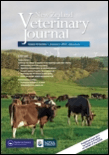
NEW ZEALAND VETERINARY JOURNAL
Connecting global discourse on animal health and welfare.NEW ZEALAND VETERINARY JOURNAL, published by Taylor & Francis Ltd, stands as a pivotal platform in the realm of veterinary science, contributing significantly to the global discourse on animal health and welfare since its inception in 1952. With an ISSN of 0048-0169 and an E-ISSN of 1176-0710, this journal offers invaluable insights within both the veterinary and general medical fields, currently achieving a commendable Q2 ranking in Veterinary (miscellaneous) and Q3 in Medicine (miscellaneous) for 2023. Its Scopus ranking places it in the 76th percentile among veterinary journals, affirming its high-impact presence in academia. While access to this journal is not open, it maintains an essential role for researchers, professionals, and students aiming to advance their knowledge and contribute to the field of veterinary science. With a commitment to disseminating quality research, NEW ZEALAND VETERINARY JOURNAL enriches the understanding of veterinary practices and enhances ongoing dialogue on critical health issues affecting animals, promoting better outcomes through scientific inquiry.

Animal Models and Experimental Medicine
Championing open access to vital research advancements.Animal Models and Experimental Medicine is a prestigious open-access journal published by WILEY that has been a significant contribution to the field of biomedical research since its inception in 2018. Focusing on the role of animal models in the exploration of experimental medicine, the journal has garnered attention for its rigorous peer-reviewed articles that bridge laboratory research with clinical applications. The journal currently holds impressive quartile rankings, including Q1 in Medical Laboratory Technology, Veterinary (miscellaneous), and strong standings across various other categories, reflecting its reputable position within the Scopus rankings. With a commitment to disseminating high-quality research that advances knowledge and practice in veterinary and medical sciences, Animal Models and Experimental Medicine offers a platform for researchers, professionals, and students to contribute to and stay informed about pivotal developments in the field. As an open-access journal, it ensures accessibility, encouraging a wider readership and fostering collaboration among the scientific community.
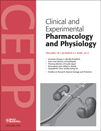
CLINICAL AND EXPERIMENTAL PHARMACOLOGY AND PHYSIOLOGY
Empowering Researchers with Quality Pharmacological KnowledgeCLINICAL AND EXPERIMENTAL PHARMACOLOGY AND PHYSIOLOGY, published by WILEY, is a premier journal that serves as a vital resource for researchers, professionals, and students in the fields of pharmacology and physiology. With ISSN 0305-1870 and E-ISSN 1440-1681, this journal has established itself as a significant contributor to scientific dialogue since its inception in 1974. Currently spanning until 2024, it consistently publishes cutting-edge research addressing both experimental and clinical advancements in pharmacology and physiology. Recognized for its quality, it holds a Q2 ranking in the 2023 Pharmacology category and notable Q3 rankings in both Physiology and Medical Physiology. The journal's coverage of topical issues not only ensures a robust platform for innovative findings but also fosters collaborations across disciplines. Although not an Open Access journal, its curated content is invaluable for advancing knowledge, as evidenced by its solid Scopus rankings, which place it within the top percentiles of its field. Engaging with this journal means staying at the forefront of research that shapes clinical practices and experimental methodologies.

Tropical Animal Science Journal
Empowering Researchers in Tropical Animal HealthTropical Animal Science Journal, ISSN 2615-787X, E-ISSN 2615-790X, is an esteemed open-access journal published by the Bogor Agricultural University, Faculty of Animal Science. Launched in 2018, this journal serves as a pivotal platform for disseminating high-quality research in the fields of Animal Science, Food Animals, and Veterinary Medicine. With its significant presence in Indonesia and a commitment to scientific innovation, it has achieved a Q3 ranking in Animal Science and Zoology and Food Animals, as well as a Q2 ranking in Veterinary (miscellaneous) as of 2023. The journal also enjoys favorable Scopus rankings, placing it in the 61st percentile for General Veterinary and demonstrating its relevance and impact in the academic community. As an advocate for open-access publishing since its inception, the journal enhances accessibility to critical research findings, making it an invaluable resource for researchers, professionals, and students alike who aim to advance their knowledge and contribute to the fields of tropical animal science.
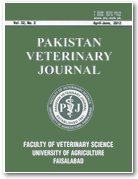
PAKISTAN VETERINARY JOURNAL
Empowering veterinary professionals through open access knowledge.Pakistan Veterinary Journal (ISSN: 0253-8318, E-ISSN: 2074-7764) is a leading peer-reviewed academic journal published by the University of Agriculture, Faculty of Veterinary Science, situated in Faisalabad, Pakistan. Since its inception, the journal has embraced an Open Access policy, facilitating the dissemination of vital research findings to a global audience and enhancing the visibility of veterinary science. With an impressive Q1 ranking in the veterinary miscellaneous category, the journal ranks #27 out of 194 in the veterinary general field according to Scopus, placing it in the top 14% of the discipline. The scope of the journal encompasses a wide array of topics relevant to veterinary medicine, ensuring that it serves as an essential resource for researchers, professionals, and students alike. By providing a platform for high-quality research from 2009 to 2024, the Pakistan Veterinary Journal continues to play a pivotal role in advancing veterinary science, promoting collaboration among scholars, and addressing contemporary challenges in animal health and welfare.

ISRAEL JOURNAL OF VETERINARY MEDICINE
Transforming Veterinary Science with Cutting-Edge ResearchThe Israel Journal of Veterinary Medicine, published by the Israel Veterinary Medical Association, serves as a vital resource for researchers, professionals, and students in the fields of veterinary medicine and animal science. With a commitment to advancing knowledge across diverse veterinary disciplines, this journal plays a crucial role in disseminating significant findings and innovations that influence both local and global veterinary practices. Although it currently holds a Q4 ranking in both the Animal Science and Zoology and Veterinary (miscellaneous) categories, the journal's open access policy, enabling free availability of articles, aspires to increase its accessibility and engagement among the academic community. The journal's convergence of research from 2007 to 2024 showcases its dedication to continuously contributing to the evolving landscape of veterinary science.
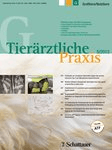
TIERAERZTLICHE PRAXIS AUSGABE GROSSTIERE NUTZTIERE
Connecting researchers and practitioners in large animal veterinary science.TIERAERZTLICHE PRAXIS AUSGABE GROSSTIERE NUTZTIERE is a pivotal journal in the field of veterinary science, focusing specifically on large animals and food production animals. Published by GEORG THIEME VERLAG KG, this journal has been a resource for veterinary professionals since its inception in 1996, delivering current research and practical insights to its readership through 2024. Despite its classification in the Q4 quartile for both Food Animals and Veterinary (miscellaneous) categories, the journal provides an essential platform for emerging studies, contributing to the interdisciplinary dialogue around veterinary practices. Researchers and practitioners benefit from the journal’s commitment to advancing knowledge, despite its modest rankings in Scopus where it stands at rank #150 in General Veterinary and #32 in Food Animals. While not currently offering Open Access options, the journals’ significant body of work remains an invaluable asset for those dedicated to enhancing animal health and welfare. TIERAERZTLICHE PRAXIS serves as a cornerstone for academic exploration and practical application in the veterinary field, fostering a deeper understanding of the complexities involved in animal care and management.

Thai Journal of Veterinary Medicine
Championing research for animal welfare and public health.Thai Journal of Veterinary Medicine, published by Chulalongkorn University, serves as a vital resource for researchers, practitioners, and students in the field of veterinary science. With an ISSN of 0125-6491, the journal has been providing a platform for the dissemination of original research and reviews since its inception, with a focus on advancing veterinary practice and animal health in Thailand and the broader Southeast Asian region. The journal is recognized in the Scopus database, currently ranked in the Q4 category for Veterinary (miscellaneous), reflecting its commitment to quality despite being in a highly competitive space. The scope of the journal encompasses a wide array of topics pertinent to veterinary medicine, ensuring accessibility to diverse veterinary disciplines. While the journal currently does not offer an open-access option, it remains dedicated to contributing valuable knowledge and insights to the veterinary community, supporting the improvement of animal welfare and public health initiatives in the region. As it continues to publish until 2024, the Thai Journal of Veterinary Medicine invites contributions that align with its objectives of fostering scholarly discourse and advancing veterinary research.